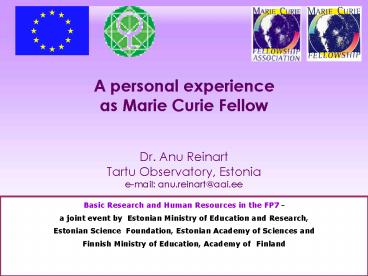Basic Research and Human Resources in the FP7 - PowerPoint PPT Presentation
1 / 6
Title:
Basic Research and Human Resources in the FP7
Description:
Marie Curie actions goal is to improve research area through its human recourses, ... For the Individual Marie Curie Fellowships the EC suggests the co-funding of ... – PowerPoint PPT presentation
Number of Views:42
Avg rating:3.0/5.0
Title: Basic Research and Human Resources in the FP7
1
A personal experience as Marie Curie
FellowDr. Anu Reinart Tartu Observatory,
Estoniae-mail anu.reinart_at_aai.ee
- Basic Research and Human Resources in the FP7
- a joint event by Estonian Ministry of Education
and Research, - Estonian Science Foundation, Estonian Academy of
Sciences and Finnish Ministry of Education,
Academy of Finland
2
Marie Curie Contract Number MERG-CT-2004-004401
Tartu Observatory, Department of Atmospheric
Physics , Estonia Dec 2004- Dec 2005Satellite
based remote sening of aquatic environment in
Estonia by the example of lake Peipsi
Fellowships
Marie Curie Contract Number MCFI-2001-00351 Upps
ala University, Department of Limnology, Sweden
2002-2003 Investigation of turbid and humic
waters using optical satellite sensors
3
What is a Marie Curie Fellowship?
- Marie Curie actions goal is to improve research
area through its human recourses, promoting
life-long learning - Grant given within a harmonized scheme under one
of the European research, training, and
development framework programmes. - 1998-2002 Improving the Human Research
Potential and the Socio-economic Knowledge base - 2002-2006 Structuring the European Research
Area-Human Resources and Mobility, Marie Curie
Actions - Mobility is an important requirement, which is
seen as a means towards creating excellence and a
European dimension to research. - It is a well-recognised fellowship scheme in
terms of scientific quality and the progressive
view to creating good conditions for mobile
researchers.
4
Marie Curie Actions
FP 6 budget 1580 million
- Host-driven actions (network, early stage,
transfer of knowledge and conferences) - Individual-driven actions
- Excellence promotion and recognition (grants,
awards, chairs) - Return and re-integration mechanisms
- Co-operation with Member States and Associated
Countries
- Marie Curie Intra-European Fellowships (EIF)
- Marie Curie Outgoing International Fellowships
(OIF) - Marie Curie Incoming International Fellowships
(IIF)
- Marie Curie European Reintegration Grants (ERG)
- Marie Curie International Reintegration Grants
(IRG)
- http//www.cordis.lu/mariecurie-actions/
5
Summary of benefits and problems of fellows by
survey (Kim Stobberup)
- Very positive in terms of scientific quality
and creating a European dimension to research. - New forms of scientific training and career
structures. - A genuine and open labour market for students
at different levels.
- Legal and administrative aspects (visa, social
security, taxes, recognition of degrees, etc.) - Social and cultural aspects (gender
considerations, language, etc.) - Weak labour market for researchers (academic
inbreeding, lack of transparency in selection
criteria, etc.) - Weak mobility between academia and industry.
- Lack of training in career essentials (project
management, proposal writing, fundraising,
communication, etc.)
6
Proposed changes in Marie Curie Actions in FP7
by European Commission
For the Individual Marie Curie Fellowships the EC
suggests the co-funding of regional, national or
international programmes which are corresponding
to the Framework Programme objectives
The EC plans to merge the actions Early Stage
Research Training (EST) and Research Training
Networks (RTN) to one single action, the "Marie
Curie Networks" (MCN) in FP7 (3-10 partners)
A new Industry-Academia partnership scheme, with
more flexible rules
A new scheme to expand the collaborations between
research centres/researchers from less-favoured
regions in Europe and other EU research centres
Extend international dimension of Marie Curie
Actions in FP7 by more flexible conditions for
the Incoming/Outgoing International Fellowships
http//www.mariecurie.org/index.php?frame2/fp7/MC
_Actions_in_FP7.html































